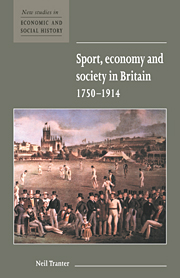5 - For health, prestige or profit?
Published online by Cambridge University Press: 18 December 2009
Summary
Whatever the precise mechanism through which it was intended to work, the promotion of organised, codified forms of sport as a force for social control was by no means the only nor, arguably, even the the most important motive underlying the Victorian and Edwardian sporting ‘revolution’. Trawling the legacy of contemporary comment and historical analysis, indeed, yields almost as many motives for participation and patronage as there were sports to indulge in, each varying markedly in the significance of its impact by time, place, social class and sport and from individual to individual according to age, sex, personal inclination or circumstance.
Perhaps because it served no grand utilitarian purpose, one of the most frequently stated reasons for participating in sport, the sheer enjoyment it provided, was largely overlooked by earlier historians. Yet, as more recent research has shown, for many people in all social classes sport was attractive simply for the pleasure it brought. To John MacFarlane, founder and patron of the first Stirling Boat Club, it was quite sufficient that the only benefit of boatracing for spectators was the ‘excitement and enjoyment’ it generated. To R. J. Girdwood, their secretary, the Strathallan Highland Games were valued ‘as much for the enjoyment they provide for residents as for their power in attracting visitors’. For the working men who formed the crew of the Scottish Central Rowing Club in the 1850s ‘the only object (was) amusement after working hours’. The Borestone Bowling Club, founded in 1858, and the Callander Highland Games, begun in 1888, are just two of many examples of sporting organisations in the Stirling region of Scotland inaugurated ‘solely to provide amusement’ (Tranter, 1989a: 243).
- Type
- Chapter
- Information
- Sport, Economy and Society in Britain 1750–1914 , pp. 52 - 77Publisher: Cambridge University PressPrint publication year: 1998

